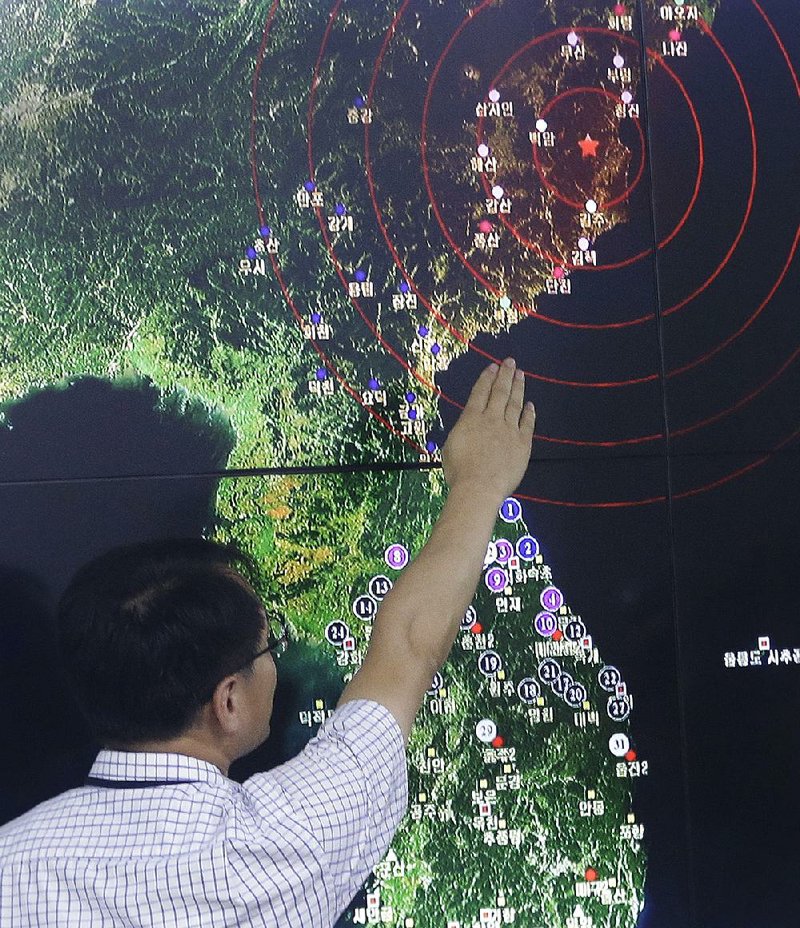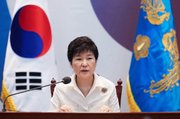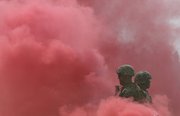SEOUL, South Korea -- North Korea drew global condemnation after it conducted a nuclear test on Friday, the anniversary of the reclusive nation's founding, and said it is now able to produce miniaturized nuclear arms.
RELATED ARTICLES
http://www.arkansas…">2 divergent on security candorhttp://www.arkansas…">Democrat: Panel chief in GOP mire over Clinton
World leaders, including South Korean President Park Geun-hye and U.S. President Barack Obama, criticized the test, North Korea's fifth, which prompted an emergency meeting of the U.N. Security Council in New York -- three days after it strongly condemned the country's latest ballistic-missile launches.
The statement agreed upon by all 15 Security Council members late Friday said diplomats will draft a new resolution in response to its earlier promise to take "further significant measures" if the North continued to defy the international community.
"In line with this commitment and the gravity of this violation, the members of the Security Council will begin to work immediately on appropriate measures" in a new United Nations resolution, the statement said. The measures will be under Article 41 of the U.N. Charter, which specifies nonmilitary actions including sanctions, it said.
U.S. Ambassador Samantha Power said the Security Council must use "every tool at its disposal," including new sanctions, "to demonstrate to North Korea that there are consequences for its unlawful and dangerous actions."
"This is more than brazen defiance," Power told reporters at U.N. headquarters. "North Korea is seeking to perfect its nuclear weapons and their delivery vehicles so they can hold the region and the world hostage under threat of nuclear strikes."
Jean-Marc Ayrault, the foreign minister of France, a permanent member of the Security Council, said North Korea's latest "provocation cannot be left without consequences, especially at the U.N. Security Council."
U.N. Secretary General Ban Ki-moon condemned what he called a "brazen breach" of U.N. resolutions.
"I count on the Security Council to remain united and take appropriate action," he told reporters. "We must urgently break this accelerating spiral of escalation."
Obama said the U.S. "does not, and never will, accept North Korea as a nuclear state."
"Today's nuclear test, a flagrant violation of multiple U.N. Security Council resolutions, makes clear North Korea's disregard for international norms and standards for behavior and demonstrates it has no interest in being a responsible member of the international community," Obama said Friday in a statement. He called on the U.N. to enact new sanctions.
The blast set off an artificial earthquake about 9:30 a.m. Seoul time, with the U.S. Geological Survey putting the quake's magnitude at 5.3. The Pentagon said it will deploy an aircraft to the region to collect air samples that can help determine the nature of the explosion.
South Korea's weather agency said the explosive yield of the North Korean blast would have been 10 to 12 kilotons, as much as 80 percent of the force of the 15-kiloton atomic bomb the U.S. dropped on the Japanese city of Hiroshima in 1945. The North's fourth test was an estimated 6 kilotons.
In a statement on state-run television, North Korea said no radiation leaked in the blast. The country's official Korean Central News Agency said the detonation of a nuclear warhead showed the regime has the ability to attach atomic weapons to rockets.
"The standardization of the nuclear warhead will enable the DPRK to produce at will and as many as it wants a variety of smaller, lighter and diversified nuclear warheads of higher strike power," the news agency said, using the acronym for North Korea, the Democratic People's Republic of Korea. "This has definitely put on a higher level the DPRK's technology of mounting nuclear warheads on ballistic rockets."
In the North Korean capital, Pyongyang, residents were delighted.
"It's really great news," said Rim Jong Su, 42. "Now, I am full of confidence that if the enemies make any little provocations, we will make a counterattack and we will surely win."
Efforts progressing
South Korea's main spy agency told lawmakers in a private briefing after the test that it does not think North Korea currently has the ability to develop nuclear weapons that can be mounted on ballistic missiles, but intelligence officials expressed worries that the North's efforts to do so are progressing more quickly than previously thought, said Kim Byungkee, a lawmaker from the opposition Minjoo Party.
Park called the North Korean test "maniacal recklessness" and warned that the moves by North Korean leader Kim Jong Un would lead to his country's destruction.
She said at a meeting of top security officials Friday night that "we have to believe that Kim Jong Un's mental state is spiraling out of control because he is not listening to any words from the international community or neighboring countries in his attempt to cling to power."
Japanese Prime Minister Shinzo Abe said he and Park talked by telephone and agreed that North Korea's nuclear test and its recent missile launches show that it now poses a "different level of threat" requiring a new response.
Japan branded North Korea an "outlaw nation in the neighborhood." Russia insisted that Pyongyang "stop its dangerous escapades." The International Atomic Energy Agency said North Korea had displayed "complete disregard of the repeated demands of the international community."
China, which pushed back against some proposed sanctions after North Korea conducted a test in January, said it called on Pyongyang to curb its nuclear plans. Foreign Ministry spokesman Hua Chunying said China, North Korea's biggest trading partner, was firmly opposed to the test and that officials would speak to counterparts at the North Korean Embassy in Beijing.
"All sides should refrain from mutual provocations and any actions that might be a threat to peace and security," China's U.N. Ambassador Liu Jieyi said.
North Korea earlier this week test-fired a trio of ballistic missiles that landed within a few hundred miles of Japan's coast. The regime, which has repeatedly flouted Security Council resolutions barring its ballistic-missile activities, has conducted at least 22 launches this year, according to U.S. officials.
North Korea's persistent pursuit of missiles and nuclear weapons has long been one of the most intractable foreign-policy problems for U.S. administrations.
Diplomacy has so far failed. Six-nation negotiations on dismantling North Korea's nuclear program in exchange for aid were last held in late 2008 and fell apart in early 2009.
The Korean Peninsula remains technically at war, as the 1950-53 Korean War ended in an armistice, not a peace treaty.
Threat growing
Speaking in Geneva early today, Secretary of State John Kerry said the United States was willing to negotiate with North Korea, but only if it agreed that the goal of those talks was for it to give up its weapons.
"We have made overture after overture to the dictator of North Korea," he said, including on normalizing the country's relationship with the West and a formal peace agreement to replace the 1953 armistice.
"All Kim Jong Un needs to do is say, 'I'm prepared to talk about denuclearization,'" Kerry said.
But American experts warn that North Korea is speeding toward a day when it will be able to threaten the U.S. West Coast.
"This is not a cry for negotiations," said Victor Cha, who served in the administration of President George W. Bush and now is a North Korea expert at the Center for Strategic and International Studies in Washington. "This is very clearly a serious effort at amassing real nuclear capabilities that they can use to deter the U.S. and others. ... There is no bigger security threat to the homeland than this."
Not only has the range of North Korea's weapons increased, but the country also is working to perfect new platforms for launching them -- submarines and mobile launchers -- giving North Korea greater ability to threaten the tens of thousands of U.S. troops stationed throughout Asia.
North Korea has fired 33 ballistic missiles since Kim took power in 2011, Seoul's Defense Ministry said. In comparison, North Korea fired 16 ballistic missiles during the 17-year rule of Kim's father, Kim Jong Il.
In both South Korea and Japan, increasingly vocal minorities have begun to advocate developing their own nuclear weapons as a deterrent.
Cheong Seong-chang, a senior analyst at the Sejong Institute in Seongnam, south of Seoul, argued that a South Korean nuclear program might distract North Korea from its efforts to build a long-range missile capable of delivering a nuclear warhead overseas.
"If South Korea arms itself with nuclear weapons, North Korea will regard the South Korean nuclear weapons, not the distant American nukes, as the most direct threat to its security," Cheong said.
Information for this article was contributed by Seyoon Kim, Hooyeon Kim, Shinhye Kang, Gearoid Reidy, Sohee Kim, Yuko Takeo, Andy Sharp, Isabel Reynolds, Chris Blake, Tony Capaccio and Kristin Jensen of Bloomberg News; by Foster Klug, Edith M. Lederer, Hyung-Jin Kim, Kim Tong-hyung, Mari Yamaguchi, Robert Burns, Joseph Krauss and Darlene Superville of The Associated Press; by Carol Morello of The Washington Post; and by David E. Sanger, Choe Sang-Hun and Jane Perlez of The New York Times.
A Section on 09/10/2016



